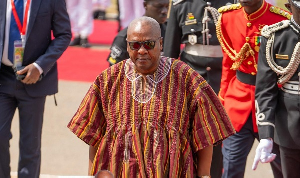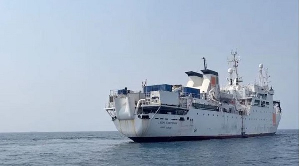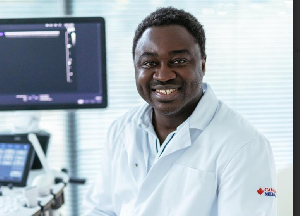Tamale, April 25, GNA - A six-member delegation from the World Health Organisation (WHO) on Monday paid a working visit to the Tamale Metropolis and Savelugu in the Savelugu/Nanton District to review the guinea worm situation in the Northern Region and to pledge support for its eradication.
The team headed by Dr. James N. Mwanzia, WHO Director, Prevention and Control of Communicable Diseases, had discussions with the Northern Regional Director of the Ghana Health Service (GHS) Dr. Elias Sory, and other partners.
They briefed the delegation on the guinea worm situation and measures and s tructures instituted towards the eradication of the diseases. The WHO team had discussion with the Tamale Metropolitan and Savelugu/Nanton District Health Management Teams, the Chiefs and people of Savelugu and met with Guinea worm volunteers to get a first hand information about the situation on the ground. The delegation, which included Dr Joaquim Saweka, WHO Representative in Ghana, was accompanied by Dr. George Amofa, Director of Public Health, GHS.
It would also visit the Kintampo and Pru Districts in the Brong Ahafo Region to interact with District Health Management Teams and the District Assemblies. The team would participate in UN Heads of Agencies' meeting in Accra and debrief the Director General of Ghana Health Service and the Minister of Health.
Dr. Amofa said about 75 per cent of reported guinea worm cases came from the Northern Region with Tolon/Kumbungu and Savelugu-Nanton Districts topping the list and pushing the country to second position in the world after Sudan.
The Savelugu/Nanton District recorded 326 guinea worm cases between January and March this year, as against 104 cases within the same period last year.
The Tamale Metropolis has also recorded 247 cases between January and March this year as against 96 cases within the same period last year.
Dr. Amofa called for "a state of emergency" to eradicate the disease from the country saying: " I am not scared about the numbers of guinea worm cases in the region, my problem is we must ensure that the systems put in place to eradicate the disease are working". He called for a political will to lead the fight against the disease and appealed to the district assemblies to commit resources towards the provision of safe water to help stem the spread of the disease.
"We cannot continue to rely solely on donors to eradicate the disease. We must show commitment, coordinate the use of the financial assistance we receive and intensify the public education in our efforts to fight the disease". At Savelugu, it was realised that illiteracy was one of the factors contributing to the spread of the disease. Some residents would refuse to drink from the boreholes with the excuse that the water had no taste but would rather drink from guinea worm infested water sources.
The chiefs and people of the town appealed to the government to connect water from the main pipeline supplying water to Tamale at Kumbungu to Savelugu to provide the township with safe drinking water. Poor staffing was also identified at the Tamale Metropolitan Health Service as contributing to the inadequate surveillance in the communities resulting in the spread of the disease. Dr. Amofa called for an intensive public education to effect a behavioral change among the people.
He suggested the formation of committees made up of chiefs, Imams and the district assemblies to enact byelaws to punish people who contaminate water sources with the disease. He also called on the health authorities to use school children as volunteers in the urban centres to improve the surveillance system and urged the assemblies to compensate the children who would come with reported guinea worm cases.
At the Manguli Dam in Tamale, tankers drivers were drawing raw water to supply residents in the Metropolis, a situation, which could be a recipe for the spread of the guinea worm disease. The drivers had also resisted the use of filters provided by the Carter Centre to filter the dam water.
Health News of Tuesday, 25 April 2006
Source: GNA
















